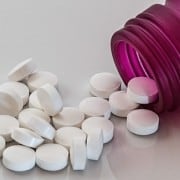Integrative Therapies and Supplements for Treating Depression
Several natural approaches can be tried to help reduce symptoms of depression. For the best results, however, it is important to first determine the underlying cause of the depression. Not only are there different types of depression, but people can have different biological causes for the same diagnosis. What is helpful for one person could cause an imbalance in another. Environmental factors also play a significant role in depression.
A thorough medical examination is encouraged to learn whether signs of depression are precursors of a disorder, or the result of a medical condition. A partial list of medical conditions or situations that have been associated with symptoms of depression is given below. Treatment related to these issues may help relieve the depression. For example, treating a thyroid problem can result in a decrease in depressive symptoms, if there was a connection between the two disorders.
Medical conditions that can cause depression
- low thyroid (also, an over active thyroid)
- allergic reactions
- difficulty metabolizing nutrients
- reactions to toxic chemicals
- stress or emotional crisis
- inflammation
- epilepsy
- chronic pain
- hormonal imbalances
- celiac disease
- diabetes
- stroke
- side effects of medication
- brain trauma
- Wilson’s disease
- Lyme disease
- Huntington’s disease
- Parkinson’s disease
- cancer of the pancreas
Due to the wide range of medical issues, it is not prudent to suggest that everyone with depression follow the same plan or protocol. A summary of approaches that have at least limited research support are included in this article. Please consult with a professional to determine which methods are most appropriate for your situation.
Dr. William Walsh on biochemical types of depression
Dr. William Walsh, director of the Walsh Research Institute in Illinois and author of Nutrient Power, oversaw biochemical laboratory testing on more than 3,000 people with depression. He suggests there are five distinct subgroups.
- High histamine (under-methylateted
- Low histamine (over-methylated)
- Pyroluria
- High copper (Hypercupremia—most common in females)
- Toxic overload
Diet and food sensitivity
Jonathan Brostoff, MD, author of Food Allergies and Food Intolerances, reports that anxiety and depression are two of the mental symptoms most commonly affected by food.
General recommendations include:
- Avoid caffeine
- Adopt a low sugar, low refined carbohydrate diet
- Eat frequent nutritious snacks with adequate protein
- Follow an anti-candida diet if candida is a factor
- Avoid foods to which you are allergic or sensitive
Elimination diets, use of provocation-neutralization therapy, and enzyme potentiated desensitization (in Europe) are methods sometimes use to treat food allergy. Newer energy medicine techniques, such as NAET (Nambudripad’s Allergy Elimination Techniques) are growing in popularity but have not been researched.
Exercise, relaxation and acupuncture
Numerous studies have shown that exercise is an effective approach for preventing and decreasing depression.
Meditation, yoga, tai chi, and breathing exercises are also reported to be helpful. Approaches such as this should be part of a comprehensive plan to address depression.
Avoidance and Detoxification
Avoidance of toxic agents and allergens is important when seeking to reduce symptoms of depression. Are you taking medicines that have a potential side-effect of depression? Do you notice that exposure to perfume or other scented products makes you feel down? Do allergens affect you? Going green is a good step for all of us, and especially if you are prone to depression. Agents in the environment can affect brain chemicals that may lead to depressive behavior.
Efforts at detoxification can occur at many levels. Depression can be caused by an excess of heavy metals in the system. Metal levels can be determined through laboratory testing, and a follow up consult with a professional experienced in detoxification methods can be useful when indicated.
Supplements
DHEA (dehydroepiandrosterone) may help reduce symptoms of depression. It is a steroid hormone made by the adrenal glands, and is a precursor to testosterone and estrogen. DHEA supplements are available over the counter. Look for certified sources. Production of DHEA declines with age, beginning in early adulthood. Long term use of DHEA has not been evaluated. It has not been recommended for severe depression. It is suggested that the treatment be considered for those who do not respond to other therapies or who are reluctant to take standard antidepressants.
B-vitamins, particularly B6 and folic acid, support the stress hormones. Some doctors recommend a B complex with additional B6 and folate or folic acid (B9) for depression. Those with depression tend to have lowered serum folate levels. Vitamin B6, or pyridoxine, is helps convert L-tryptophan to serotonin, and L-tyrosine to norepinephrine. A B12 deficiency can also be involved in depression. Choline is also beneficial for some, depending on the biochemical makeup of their depressive disorder.
Vitamin C: This popular antioxidant plays a key role in the conversion of tryptophan to serotonin and may be useful as a nutritional supplement for depression.
Magnesium is a mood stabilizer, and plasma magnesium levels have been found to be lower in depressed individuals than control subjects. Administration of intravenous magnesium helped relieve depression, as well as pain.
Amino acids: As concerns over the side effects of antidepressants increases, interest in amino acids has been sparked. Certain amino acids are particularly effective in treating depression because of their role as precursors to neurotransmitters.
- L-Tyrosine is the precursor to norepinephrine, and research supports its use in patients who failed to respond to other treatments.
- D- and L-Phenylalanine Phenylalanine is converted in the body to L-tyrosine, and studies have linked it to possible use as an antidepressant. Research is needed to understand its potential more fully.
- L-Tryptophan was one of the first successful nutritional supplements for depression, but it was banned when a bad batch was imported. The problem was traced to faulty manufacturing, but tryptophan is no longer as easy to obtain as it once was. In its place, 5HTP is often supplemented.
- 5HTP (5-hydroxytryptophan) is often used in place of tryptophan, and is a relatively inexpensive treatment that benefits some types of depression.
- SAM-e (S-adenosyl-methionine) has received major attention in the past decade as a potential remedy for depression. As with other supplements, it can be a valuable help for some, but not all cases of depression.
Essential fatty acids: Omega-3 fatty acids, including alpha-linolenic acid (ALA), eicosapentaenoic acid (EPA), and docosahexaenoic acid (DHA) appear to be helpful for a variety of chronic illnesses, including depression. The exact mechanism involved is not yet known. Achieving a balance among fatty acids in the body is part of the goal of nutritional therapy. However, experts do not yet agree on the ideal balance. Many people have an excess of omega-6 fatty acids due to its prevalence in certain processed foods. High quality omega-6 is healthful, and some people do not need additional omega-3s as much as they need high quality omega 6 or other oils. It is recommended that you consult a nutritional specialist before treating with essential fatty acids. Evening primrose oil, borage oil, flax seed, and fish oils, and walnuts are good sources of EFAs.
Herbs
- St. John’s wort has long been used for treating mild depression, anxiety, and sleep disorder. Research supports its use for moderate depression as well. While some studies have had conflicting results, the overall picture is positive. This herb should not be taken with certain antidepressant medications, anti-retroviral medications, and a number of other drugs. You should inform your physician if you are taking, or intend to take, St John’s wort. It can cause sun sensitivity.
- Ginkgo (Ginkgo biloba) extract is sometimes used for patients who are resistant to standard therapies, particularly among the elderly.
- Several other herbs may be recommended, with less scientific backing. Herbal therapies are better documented for anxiety than for depression at this time.









